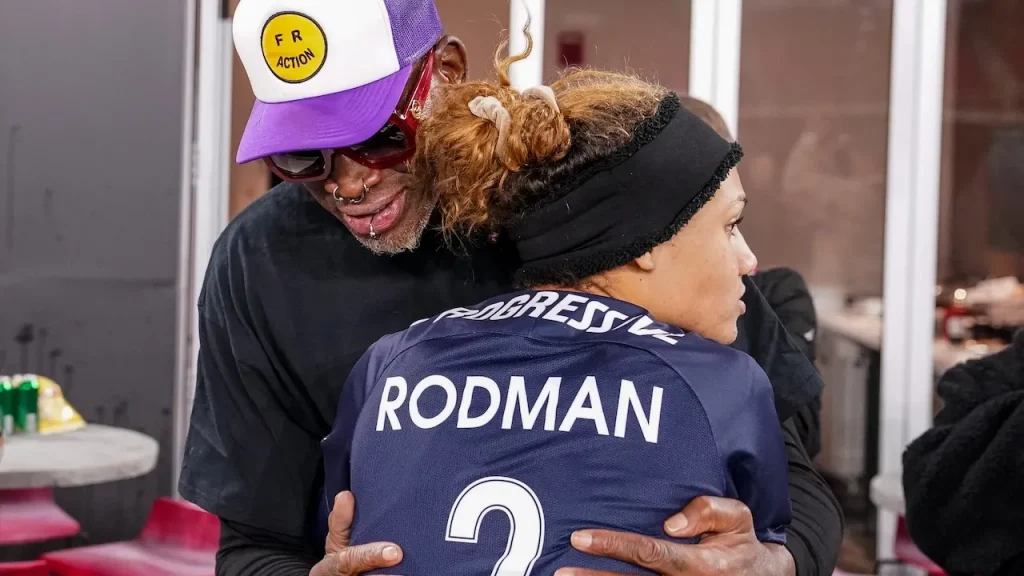Trinity Rodman, a rising star in American soccer and forward for the Washington Spirit, recently opened up about her complex and often strained relationship with her father, NBA legend Dennis Rodman, during an appearance on the “Call Her Daddy” podcast. The interview offered a candid glimpse into the emotional toll her father’s public persona and erratic behavior have taken on her, revealing a deep-seated frustration with the constant media focus on their relationship and the personal trauma she has endured. Trinity emphasized the pressure she feels to protect her father’s image, often at the expense of her own emotional well-being. This pressure manifests in interviews where she is repeatedly questioned about her father’s feelings and involvement in her life, forcing her to navigate a delicate balance between honesty and preserving a semblance of familial harmony. She expressed a sense of weariness with this dynamic, highlighting the emotional labor involved in constantly deflecting inquiries and downplaying the complexities of their relationship.
A recurring theme throughout Trinity’s account is her internal conflict between acknowledging her father’s struggles and recognizing his self-centered tendencies. She admits to feeling sympathy for him, recognizing that he has faced his own challenges, yet simultaneously resents his apparent desire to exploit their relationship for public attention. This internal struggle creates a sense of frustration for Trinity, as she grapples with the desire to be truthful about her experiences while still attempting to extend some level of understanding towards her father. She describes his behavior as “extremely selfish,” noting his penchant for the spotlight and his tendency to use his children as props in his public appearances. This manipulation, she explains, has contributed significantly to the emotional turmoil she has experienced, emphasizing the psychological impact of his actions beyond the superficial realm of public perception.
The interview also shed light on the infrequent and often difficult nature of their communication. Trinity revealed that she does not have her father’s number saved in her phone and that they can go months without speaking. When he does reach out, it is often with unconventional requests, such as invitations to participate in reality TV shows, further highlighting his focus on public image and self-promotion. These sporadic attempts at contact, she explains, are often tinged with pain and discomfort, as she associates his calls with a sense of dread and an anticipation of further emotional upheaval.
Adding another layer of complexity to their communication is the fact that Dennis Rodman’s calls often come when he is intoxicated. This detail paints a picture of a relationship fraught with unpredictability and instability, further compounding the emotional burden Trinity carries. The combination of infrequent contact, unexpected requests, and his inebriated state creates an environment of apprehension and emotional exhaustion for Trinity, making even the simple act of answering a phone call a potentially distressing experience.
One particularly telling anecdote involved an unknown number from Texas calling Trinity, which she initially dismissed as spam. Upon realizing it was her father, she found herself confronted with a lengthy voicemail, a 40-second message she felt unable to listen to. This incident encapsulates the emotional fatigue she experiences in relation to her father. The length of the voicemail, in contrast to their infrequent communication, becomes symbolic of the emotional weight and potential for further turmoil that any interaction with him represents. Her decision not to listen underscores her need to protect herself from further emotional distress and maintain control over her own emotional boundaries.
In essence, Trinity Rodman’s interview offers a poignant portrayal of a daughter navigating the complexities of a strained relationship with a famous and often controversial father. She articulates the emotional labor involved in managing public perceptions, the internal conflict between sympathy and resentment, and the challenges of establishing healthy boundaries in a relationship marked by inconsistency and emotional volatility. Her willingness to speak openly about these struggles provides valuable insight into the human cost of fame and the often unseen challenges faced by the children of public figures. The interview serves as a testament to her resilience and her determination to prioritize her own emotional well-being despite the pressures and complexities of her family dynamic. It also underscores the importance of open conversations about mental health and the impact of familial relationships, particularly in the context of public scrutiny.















